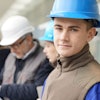
By Don Talend, Contributing Editor
Contractors need to think differently about their response to accidents, unethical behavior or other missteps in which their companies are publicly implicated as a matter of the long-term survival of their businesses. Crisis-management expert James Lukaszewski says the effective approach to crisis management is rooted in actually asking for victims’ forgiveness.
Having helped hundreds of company leaders manage crisis situations for more than 40 years, Lukaszewski, chairman of the Lukaszewski Group, Bloomington, Minn., points out that, even a perfectly strategized response to a crisis, if poorly communicated, can compound damage to a company’s reputations well beyond the adverse events themselves. He identifies behaviors that fan the flames and should be avoided. He also recommends several essential actions.
Factors in victim mismanagement
An error or bad deed is inherently regrettable, but it is only a crisis if people, animals or living systems become victims through harm. Victim designation is the choice of those whose well-being or property are harmed, or those who appoint themselves to speak up for harmed animals or living systems. Company leaders’ actions during crises strongly influence this choice for better or for worse.
Several factors cause executives to mismanage victims during crises:
- The industry’s inherent litigious nature influences company leaders to take a defensive posture that prioritizes shortsighted prevention of legal exposure over victim management during a crisis.
- Victim behavior is emotional, but most executives – typically trained in emotionally detached, analytical fields such as engineering and business – cause themselves and their brands more trouble by failing to validate victim behavior.
- Victims have much more power to damage companies through litigation, media interviews and social media than executives may realize.
- Company leaders’ peers often criticize them for showing empathy to victims.
As a result, executives typically develop a mindset toward victims that is potentially harmful to their careers and their companies’ reputations. This mindset can trigger avoidable reactions to victims.
Behaviors to avoid
Over his career, Lukaszewski has identified predictably destructive patterns of executive behavior he calls “Profiles in Failure.” Component behaviors include:
- Silence: The most toxic strategy, it results from both the advice of lawyers and many organizational cultures characterized by groupthink. Silence magnifies every mistake and causes victims, the media and public to assume executive culpability.
- Stalling: Waiting until all of the facts are available before acting is foolish and inexcusable. Speed beats smart every time. Stalling triggers uncomfortable questions from reporters, e.g., “What did you know, and when did you know it?”
- Denial: Executives who refuse to accept that their companies’ errors have produced victims are prone to silence or delays in public acknowledgement of errors.
- Victim confusion: In its interactions with reporters, angry neighbors, victims’ families and social networks during a crisis, management often considers the company a victim, too. This mindset dilutes the validation external victims seek.
- “Testosterosis”: When victims seek validation that they have been harmed, executives and their attorneys and colleagues look for ways to counterpunch rather than reach out.
- Arrogance: Reluctance to apologize, express concern or empathy, or take appropriate responsibility out of concerns relating to liability, weakness or creating copycats is common.
- Search for the guilty: Executives often shift their focus internally to expose and punish those who blame the company for a disaster.
- Whining: Many executives feel unfairly treated by real victims and social media communities and perceive a lack of acknowledgement of the company’s positive contributions to society.
Nine specific recommended steps
Lukaszewski recommends nine specific steps in successful victim management:
- Candor: Immediate public acknowledgement that a problem exists, that victims have been harmed and that the company will take prompt actions to remediate the situation
- Extreme empathy/apology: Spoken and written statements of humble, personal apology for harm inflicted, which satisfies a powerful victim need; “the atomic energy of empathy,” apologies slow the momentum of a company’s troubles
- Explanation: Prompt and continuous disclosure of even partial information about what leadership knew, and when
- Affirmation: What has been learned from the situation and how it will influence future actions and a commitment to report all information for as long as victims ask questions
- Declaration: A public commitment to take steps to prevent similar future risks
- Contrition: Continuing verbalization of regret and acceptance of responsibility for the event
- Consultation: A request for help and counsel from groups such as victims, governments and the community in which the company is based to develop solutions that prevent reoccurrences
- Commitment: Publically setting of goals at zero errors, defects and poor decisions
- Restitution: Going beyond community and victim expectations to remediate the problem—a wise long-term investment in goodwill
Taking these steps quickly during a crisis shuts down the critics and makes your company much less interesting to the news media and social media. Moreover, crises are remediated more quickly, cost a lot less to resolve and are less prone to litigation. Executives who skip any of the steps or carry them out without sincerity will put their companies through much more trouble and probably won’t be around by the time the crisis is resolved.



















